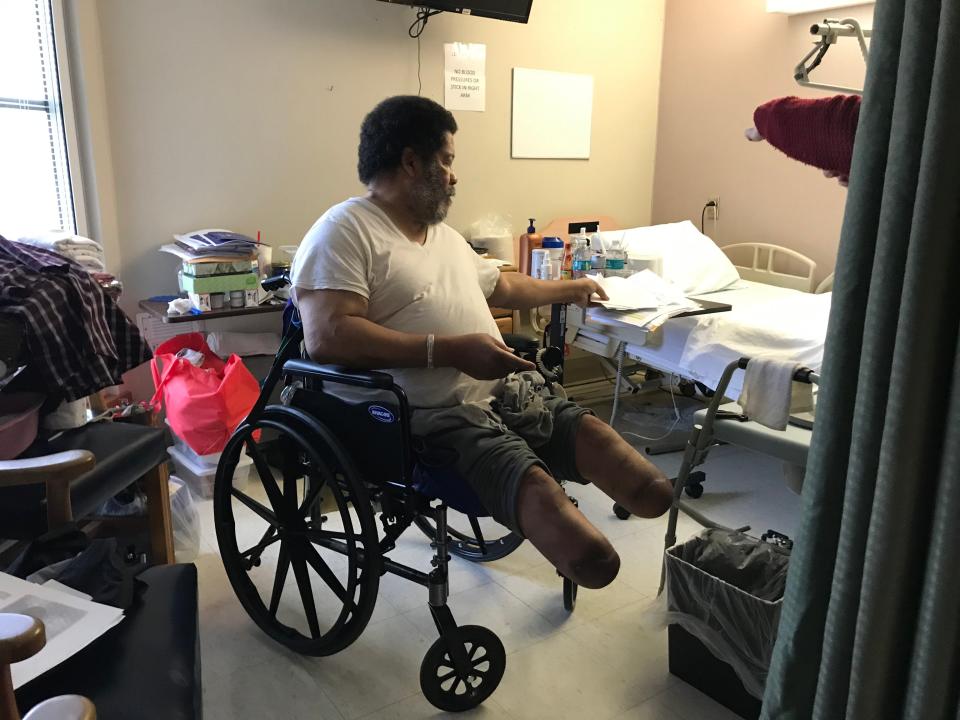A vet's prosthetic legs were repossessed two days before Christmas. He got them back, but broken

COLLINS, Miss. — A man walked into a nursing home for military veterans two days before Christmas, picked up Jerry Holliman's legs and left.
Holliman, 69, had hopes of moving back to his home in Hattiesburg and returning to an independent lifestyle with his new prosthetic legs.
Then they were repossessed.
The U.S. Department of Veterans Affairs wouldn't pay for his prosthetic legs, Holliman said, and Medicare wanted him on the hook for co-pays. As Holliman tried to navigate what felt like a maze of paperwork, it felt like his country was forgetting him.
"Medicare did not send me to Vietnam," Holliman said. "I was sent there by my country... with the understanding that if something bad happened to me, that it would be covered by the VA."

Holliman served active duty in the U.S. Army twice — as an 18-year-old specialist who volunteered to fight in Vietnam and as a 53-year-old master sergeant in Iraq. He earned Bronze Stars in both wars, according to his discharge papers. Between active duty and the U.S Army National Guard, Holliman said he served 40 years in the military.
While in Vietnam, Holliman said he was exposed to Agent Orange, a chemical the American military used to kill vegetation. The chemical also caused diseases to Vietnamese and U.S. Service members, including cancers and diabetes.
Holliman said he's survived three forms of cancer, but in recent years, diabetes began affecting his legs.
The U.S. Department of Veterans Affairs paid for a motorized wheelchair for Holliman a few years ago, he said. It helped get him into the kitchen of his Hattiesburg home using a ramp in his garage, but the rest of his house is not wheelchair accessible.
At the time, Holliman could still walk a bit, and he never expected he would lose his legs entirely.
Then they got worse. Gangrene set in, which meant emergency surgery.
Doctors amputated his right leg in November 2018, and the left leg in April. Holliman came to the Veterans Home in Collins for what he thought would be a temporary stay — just until he got his mobility back.
Who should pay?
Holliman said he got a pair of prosthetic legs in August from a company called Hanger, which has offices in Hattiesburg.
He held onto paperwork, including handwritten notes on how to use and clean his prosthetic legs. He started going through rehab at the nursing home.
After a few sessions with the Hanger staff, Holliman said he was told the U.S. Department of Veterans Affairs would not pay for his prosthetic legs.

He tried to raise the alarm with staff at the Veterans Home in Collins, a state-run facility, but Holliman said he knows the ultimate decision to pay for his prosthetic legs lies with the VA — an entity he compared to Goliath.
Susan Varcie, a spokeswoman at the VA Medical Center in Jackson, said she could not comment on Holliman's case due to privacy laws.
Hanger declined to say how much a typical prosthetic leg costs, but a 2013 report from ABC News said the cost for a single leg can range from $5,000 to $50,000 for adults.
Holliman said he was encouraged to use Medicare to pay for the prosthetic legs, but he was never shown a total cost, and the forms indicated he would have to pay a co-pay.
So he refused, never expecting what would come next.
On Dec. 23, an employee from Hanger came to the Veterans Home to see Holliman. Holliman said the man was adjusting his prosthetic legs, then asked himto sign some paperwork for Medicare.
Holliman said he declined because the U.S. Department of Veterans Affairs should pay for the legs in full.
"This is their responsibility," Holliman said.
The man responded by taking the legs and leaving.

The only evidence that remained were the papers Holliman held onto and a pair of new black gym shoes sitting underneath a table in his room he had to buy for the prosthetic legs.
Their only purpose now seemed to be a reminder of what he had lost.
Holliman's son, Jerald, said he was "shocked" to learn his father's legs had been taken.
”He was always under the impression, 'These were my legs,'” Jerald said. "...What he's done for his community, his country ... for them to have taken these legs is an insult."
With his legs gone, Holliman felt like he was falling through the cracks of the American health care system. He called the Clarion Ledger, part of the USA TODAY Network, which in turn reached out to Hanger prosthetics about the case.
A reporter and photographer from the Clarion Ledger went to the Veterans Home in Collins to meet with Holliman on Jan 2. Hours after they left, a man came to Holliman's room.
Holliman said it was the same employee from Hanger who took his legs. This time, he was bringing them back. He asked Holliman about his Bronze Star awards.
"He didn't know that I received those things," Holliman said.
There was a problem with the legs, though. No adjustments had been made to them, Holliman said, and he can't walk without one leg folding in on him.
“'You can have ‘em,’” Holliman recalled the man saying, “but they're not going to do anything to them until the VA pays them.”
The prosthetics company responds
When the Clarion Ledger initially reached out to Hanger, spokeswoman Meghan Williams did not deny Holliman's account of having his prosthetic legs taken. She said she could not confirm or deny it because federal privacy laws prevented Hanger from speaking about individual clients.
She said Hanger could comment on the case if Holliman had signed a waiver of his privacy rights, but Holliman said he received no communication from Hanger asking for him to waive those rights.
"Hanger Clinic does not take back prosthetic devices after final delivery to a patient has been made," Williams said in a statement.
However, Williams said "final delivery" is only complete when "a patient has signed a verification of receipt that allows a claim for payment to be submitted to the applicable insurance payer."

Because Holliman didn't sign the Medicare paperwork, it appears that Holliman had possession of the prosthetic legs, while Hanger simultaneously considered those legs undelivered.
Now, Holliman has the legs back, but it's unclear why. Holliman thinks it's because he contacted the media.
When the Clarion Ledger reached out to Hanger about the return of the legs, Williams reiterated that federal privacy law prevents Hanger from talking about Holliman's case.
"We understand how critical the devices we build are for our patients’ rehabilitation," she said in a statement. "It is our policy, in accordance with regulatory guidelines, to follow up with every patient we see and make necessary device adjustments through delivery and for at least 90 days afterwards. We are committed to empowering human potential, and want to see our patients regain their mobility and independence."
That's not what Holliman said he was told.
The legs are basically useless if Hanger won't make any more adjustments, Holliman said, and without those adjustments, he's stuck at the Veterans Home. Depression and anxiety are setting in, he said.
At 69, Holliman said he's one of the youngest residents at the home. He said his roommate died last month.
“I was here for one thing — to get my prosthetic legs, learn how to walk in ‘em, and go home," Holliman said. "...I’ve been here over a year. I wanna go home. This place is not for me. It’s a dignified place for these guys to die, that’s what it is... It’s probably every other month somebody dies here. And you know what they do? Put a flag over them, and play 'Taps' and take them outta here.”
When asked about his future, Holliman said he wants to live another 20 or 30 years, enjoy his retirement and go fishing.
“I’m like a cat. I got nine lives. I think I’m on the last one, though,” Holliman said. After a pause, he added: “It’s not my time. You know, we go through a lot. Some of us can go out there and slip on a piece of bubble gum, and we die. But it’s not meant for me to go yet.”
Follow Giacomo "Jack" Bologna on Twitter: @gbolognaCL.
This article originally appeared on Mississippi Clarion Ledger: VA, Medicare dispute leaves Bronze Star vet without prosthetic legs

